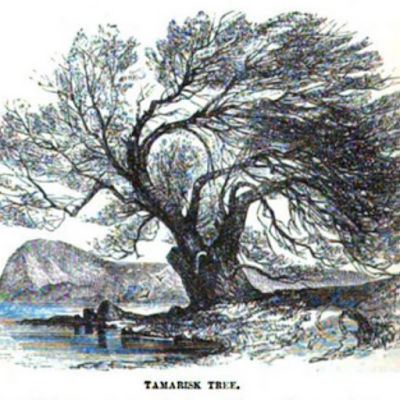As I use the Lord’s Prayer as the framework for many of my morning prayers, it reminds me God is our Father, and that I am part of His body. And when I pray hallowed be thy name, I praise his names with new understanding as I continue in my study on the names of God. Today’s post will look at El Olam, and at the end of this post I’ve included a list of the names we’ve already studied with quick explanations of how I incorporate them when praying.
El Olam in the Bible
"Abraham planted a
tamarisk tree at Beersheba, and there he called on the name of the Lord, the
Everlasting God” (Gen. 21:33). This NSAB translation tells us the El Olam meaning.
He is our Everlasting God, without beginning or end. But in my mind, I wanted
to know why Abraham used El Olam as he planted the tamarisk tree. How is it related?
What is a tamarisk tree
I looked into the tamarisk tree to help provide context. Research revealed it is an evergreen tree native to dry areas of southern Europe, northern Africa, and western Asia. It can grow up to 30 feet tall. According to The Natural History of the Bible by Henry Baker Tristram (1868) it is a “very graceful tree, with long feathery branches and tufts, closely clad with the minutest of leaves, and surmounted in spring with spikes of beautiful pink blossom, which seem to envelop the whole tree in one gauzy sheet of color.”
That evergreen quality of the tamarisk tree represents:
- Hope and life
- New beginnings
- Reminder that better days are ahead
Abraham’s use of El Olam
With this in mind, I looked at Abraham’s use of El Olam and the planting of the tamarisk tree and the context of the rest of the chapter.
Isaac born (vs. 1-7): Earlier in this chapter, Sarah had given birth to her promised son, Isaac. The LORD had fulfilled his promise made to Sarah. She conceived and bore a son to Abraham when she was past the age of conceiving and Abraham was 100 years old! Abraham (and Sarah) witnessed God’s faithfulness.
Hagar and Ishmael sent out (vs. 9-17): In these verses we see Abraham faced with a big challenge. He is told to send Hagar and Ishmael away. It distressed him greatly because he loved his son Ishmael but Abraham didn’t hesitate to obey. He rose early in the morning, gave Hagar and 16-17 year old Ishmael some supplies, and sent them peacefully on their way. God had told him not to be distressed “for through Isaac your descendants shall be named. And of the son of the maid I will make a nation also, because he is your descendant” (vs. 13-14). Again, Abraham trusted God’s faithfulness.
The Treaty at Beersheba (vs. 22-31): Just before the planting of the tamarisk tree, we see a treaty made between Abraham and Abimelek and Phicol the commander of his forces. Abimelek had said to Abraham, “God is with you in everything you do. Now swear to me here before God that you will not deal falsely with me or my children or my descendants. Show to me and the country where you now reside as a foreigner the same kindness I have shown to you.” Abraham swore it in vs. 24 Abraham says, “I swear it.”
At the start of the next chapter, Abraham is challenged to offer his son Isaac as a sacrifice. I mention this, because all these things deal with Abraham as a man of faith. In Gen. 15, Abraham "believed in the Lord; and He reckoned it to him as righteousness." All these things in chapter 21 reflect that faith. He had eternity in view and faith in an Everlasting God. The tamarisk tree served as a reminder that El Olam, the Everlasting God” keeps his promises throughout time."
Hallowed be Thy name
As a quick reference, here are the names we’ve already took a look at here at Lightbearers and how they help us focus our praise and thanks to Him:
Jehovah Jireh (The Lord will provide): Reminds me of his love and how he provided Jesus to take away my sin.
Jehovah Nissi (The Lord my banner): Reminds me that he is the standard to look to while in the chaos of this world and the spiritual battle we are in.
Jehovah Raah (Rohi, Roi) (The Lord is my shepherd): Reminds me of his role as shepherd: Protector, Guide, and the one who brings us home. It also reminds me to be watching for the Lord’s return for his church.
Jehovah Rophe (The Lord your healer): Reminds me of my spiritual healing.
Yahweh Sabaoth (The Lord of hosts): Reminds me that my confidence is in the Lord of hosts who goes forth before me. To get my eyes off the “giants” of this world and on my Lord.
Adoni (God is sovereign): Reminds me that God is supreme in power; possesses supreme dominion and is sovereign ruler of the universe. That he is supreme; superior to all others; chief. That God is the sovereign good of all who love and obey him.
Jehovah
Shalom (The Lord is Peace): Reminds me that Jehovah (the becoming one) (in
his relationship with you) desires to give you a (sense of completeness and
tranquility). It is an inner peace, not outward peace that depends on
circumstances.



